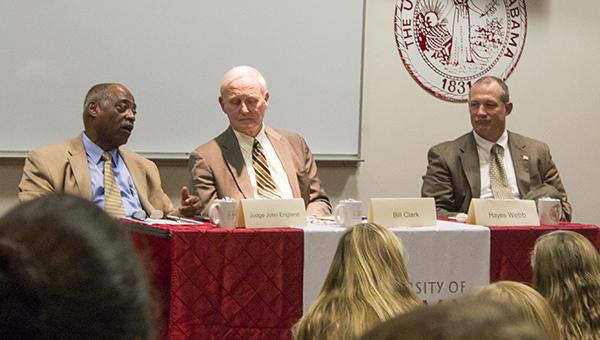“I think it’s very important that students do come and hear speakers like this because its easy for law officials to prey on our ignorance because we don’t know what our rights are and how to go about a situation if you were to be accused,” Kathryn DeGeller, a junior majoring in public relations, said. “It’s very important to know exactly what your rights are.”
Panel participants were John England, Tuscaloosa Circuit judge and former Alabama Supreme Court justice; Hayes Webb, attorney in Tuscaloosa and Bill Clark, attorney and past president of the Alabama Bar.
The panel answered questions from their own professional viewpoints. England explained officers have different agitation limits.
“It sounded like almost all of their responses revealed that the law is very subjective to who you talk to,” DeGeller said. “They mentioned that depending on the police officer, you could be charged with more or you could be charged with less, which I thought was really interesting because they talk about the law being fair and just. If you talk to one person and get in more trouble than if someone talks to someone else, it doesn’t really sound like they’re upholding to that.”
A group of Town Hall coordinators described what they learned from the panel last night.
“Be polite always because that’s number one,” Ashley Buchanan, a junior majoring in marketing and finance, said. “It’s better to go along with what a police officer is saying versus just arguing with him.”
Webb said it is best not to argue with officers no matter what. Even if one has done nothing wrong, they can get in trouble for being disorderly. Clark said it is best not to antagonize, argue with or challenge officers, and England agreed.
Clark encouraged students to think before they act and to make decisions about right and wrong on their own before getting in trouble. He said someone doesn’t have to answer if an officer asks them if they have been drinking, but the officer can still observe and get an idea if someone is drunk based on their demeanor.
Clark said anger never helps, because officers are just doing their job. If someone combats an officer, they can be arrested and even if the charges are dropped or if the person is found not guilty, they will still have it on record.
England said he doesn’t see a problem with people waiting for a well-lit area before they pull over during a traffic stop. He said the officer would appreciate the safety. Webb suggested putting on hazard lights so the officer knows the party is aware of him and is looking for a place to stop.
Webb said typically law enforcement may be unpleasant, but they are professional. He said they can’t search a car just because they want to – there has to be a reason.
England said if a car is pulled over for a tail light being out and the police smell marijuana, that gives them probable cause to search the car. If officers question the driver and passenger, but each gives a different story, that gives officers reasonable suspicion. They will question until they find a probable cause.
“They talked about the extent of probable cause which some people don’t understand or know how much power probable cause has, whether it be getting pulled over, or a house party, or any of that,” said Maria O’Keefe, a senior majoring in history.
Clark said if the officer has no reason to pull someone over, they could fight any charges that are received during the traffic stop.
England also said a threat is a crime. Clark said the question is whether the threat is legitimate. Webb said when making a threat, someone can be charged with harassment for fear of safety, a felony for threatening murder or a misdemeanor for threatening to beat someone up.









